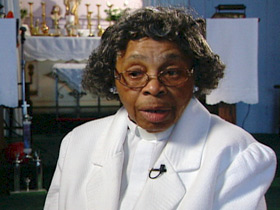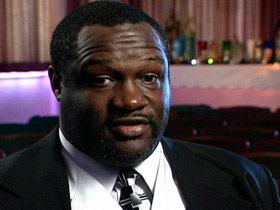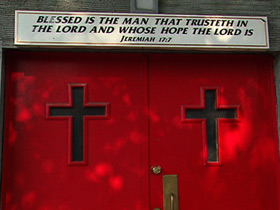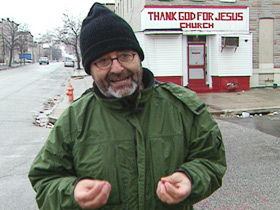BOB ABERNETHY, anchor: Now, a look at one of the signs of life in poor city neighborhoods -- storefront churches. As Jody Hassett Sanchez reports from Chicago, most of them do not thrive by preaching fear of hell. They preach love and gratitude, and they meet their worshippers right where they are.
JODY HASSETT SANCHEZ: Pastor Evelyn Atwood has been leading the worship for more than 20 years at Lily of the Valley Spiritual Church in one of Chicago's grittier neighborhoods. But she always had to hold down a second job during the week because the storefront church couldn't pay her a salary.
Pastor EVELYN ATWOOD (Lily of the Valley Spiritual Church, Chicago): I worked in the stockyard. I worked in the factory, which as of now I don't work, because I'm retired -- a senior citizen. I'm 81-years-old. So, you know, I'm not working nowhere now, so that's the way that goes.

SANCHEZ: Well, that's not exactly true. Pastor Atwood, who now shares the preaching duties, is still at the church several days a week doing whatever needs to be done to keep the church up and running.
Pastor ATWOOD: We're like a family. I wash dishes as much as anybody else, scrub floors, do anything else that it might be kept clean.
SANCHEZ: Churches like Lily of the Valley got the name "storefront" because they often exist in abandoned commercial strips in some of the country's toughest neighborhoods. The rent is cheap, and landlords are grateful to have church members instead of drug dealers coming and going from their property.
CAMILO VERGARA (Author, HOW THE OTHER HALF WORSHIPS): There is a presence on that street in a building that would be abandoned -- that is, three, four times a week, you know, when they have choir practice, when they pray, when they get together for service on Sunday that building is occupied, so you have eyes on the street.
SANCHEZ: Camilo Vergara has been documenting storefront churches for more than three decades. His photos and essays appear in his new book HOW THE OTHER HALF WORSHIPS. It was the vibrant, hand-painted exteriors of the churches that first grabbed his attention.
Mr. VERGARA: To me what it says is, "We're alive!" The neighborhood may be disappearing. Many of the houses may be destroyed. Many other houses may be boarded up. The factories certainly left a long time ago. But we are still here.
SANCHEZ: Storefront churches don't look like traditional houses of worship, and they don't observe many of the same rules. Preachers don't have to have a theology degree or even a college diploma. They're rarely affiliated with mainline denominations, and they often borrow elements of several different faith traditions.
Pastor ATWOOD: When you come in this church you say, "Yeah, that's Catholic," so you feel kind of comfortable. You look over there and you see Moses: "Oh yeah, that's what the Jewish people believe." Then, when we get one of them hallelujah services, you know, folks get to shouting and going on, and they say, "Ah, we're right at home. This is a Baptist church."
SANCHEZ: Lily of the Valley was founded by a woman. Storefront churches have historically offered women and minorities the chance to hold positions of authority. They've also welcomed those who might not feel comfortable in larger, more traditional churches. The sermons sound a bit different at these street-side sanctuaries. You won't hear much talk about culture wars, politics or damnation. Instead, the message is one of hope and thankfulness.

Reverend KEN ATWOOD (Lily of the Valley Spiritual Church, preaching): No matter what your situation is, it's not too big for God. I know you're looking at me, and my clothes may be tattered, and I may be ragged, I may be riding the bus, but I'm still here by the grace of God.
Mr. VERGARA: I seldom hear people who are affluent or live under stable circumstances thank the Lord for having woken up this morning, as I hear folks in very poor churches. I have also heard people thank the Lord for having a driver's license, for having a husband, for having food to eat, for having a bed to sleep in.
Rev. ATWOOD: If you are someone who is trying to get to work, and you get a bus pass - a seven-day bus pass, and you got no more money but you got your bus pass, how huge is that, that you can get to work every day? There are no small blessings. Every blessing in itself is magnificent, and if we learn to appreciate those things, then greater things can happen for us.
Pastor ATWOOD: We don't preach hellfire so much, because we want people to learn to appreciate God for the love -- his love for us, not the fear of going to hell, but the love that God has to offer to mankind.
SANCHEZ: Reverend Ken Atwood, who shares the preaching duties with his mother, faces challenges he probably wouldn't face at a more traditional church.
Rev. ATWOOD: We've got -- there's a family across the street, and they like to play the greatest in hip-hop entertainment on Sunday. And it's not that I have anything against those great hip-hop artists, you know, but I have to go over there and ask them, "Please turn the bass down a little bit so I can get the service going over here."

SANCHEZ: Storefront churches tend to cluster together. You'll often see two or three on the same block, which raises the question, why are there so many of them?
Rev. ATWOOD: It doesn't matter if there's one on every block. We don't stop building, we don't stop opening liquor stores and bars because there's one down the street, do we?
CONGREGATION (Singing): How wonderful it is that Jesus still takes care of me.
SANCHEZ: Perhaps another reason is that these urban churches do more than meet the spiritual needs of the neighborhood. Churches like Chicago's Spirit Redeemed are often the first stop for locals seeking healthcare and other basic services.
Reverend MICHAEL GRIFFIN (Spirit Redeemed Church, Chicago): We do blood pressure screening, premedical, whatever we can do medically. We will do that. We also have counselors on staff, I mean available for substance abuse, homelessness, shattered, battered women, HIV/AIDS awareness.
SANCHEZ: There isn't much these churches haven't seen or experienced.
Rev. ATWOOD: I have had all those experiences, from narcotics to street life to what have you. And I tell people jokingly, but it's true, if God can save me he can save anybody.

Rev. GRIFFIN: If you're a prostitute, we have someone who has been that route. If you are a drug addict or drug user, if you were the dealer, we have people whose lives have been changed.
SANCHEZ: For these churches, the missionary work is right outside the door. Step inside the door, and the style of the service might seem different, but ultimately the message isn't.
Mr. VERGERA: They are speaking about the same things. What's going to happen after you die? What's the relationship between you and God? What are you here on Earth for? You know, all of those questions?
SANCHEZ: What preachers say wherever they are.
For RELIGION & ETHICS NEWSWEEKLY, this is Jody Hassett Sanchez.





